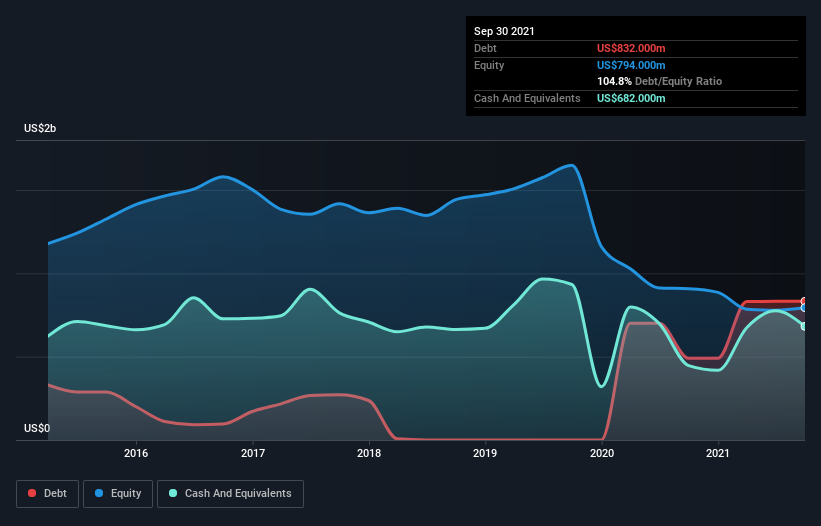- United States
- /
- Interactive Media and Services
- /
- NasdaqGS:TRIP
We Think TripAdvisor (NASDAQ:TRIP) Has A Fair Chunk Of Debt

The external fund manager backed by Berkshire Hathaway's Charlie Munger, Li Lu, makes no bones about it when he says 'The biggest investment risk is not the volatility of prices, but whether you will suffer a permanent loss of capital.' So it might be obvious that you need to consider debt, when you think about how risky any given stock is, because too much debt can sink a company. We can see that TripAdvisor, Inc. (NASDAQ:TRIP) does use debt in its business. But should shareholders be worried about its use of debt?
Why Does Debt Bring Risk?
Generally speaking, debt only becomes a real problem when a company can't easily pay it off, either by raising capital or with its own cash flow. If things get really bad, the lenders can take control of the business. However, a more frequent (but still costly) occurrence is where a company must issue shares at bargain-basement prices, permanently diluting shareholders, just to shore up its balance sheet. By replacing dilution, though, debt can be an extremely good tool for businesses that need capital to invest in growth at high rates of return. The first thing to do when considering how much debt a business uses is to look at its cash and debt together.
View our latest analysis for TripAdvisor
How Much Debt Does TripAdvisor Carry?
As you can see below, at the end of September 2021, TripAdvisor had US$832.0m of debt, up from US$490.0m a year ago. Click the image for more detail. However, because it has a cash reserve of US$682.0m, its net debt is less, at about US$150.0m.

How Healthy Is TripAdvisor's Balance Sheet?
According to the last reported balance sheet, TripAdvisor had liabilities of US$363.0m due within 12 months, and liabilities of US$1.16b due beyond 12 months. Offsetting these obligations, it had cash of US$682.0m as well as receivables valued at US$253.0m due within 12 months. So it has liabilities totalling US$583.0m more than its cash and near-term receivables, combined.
Since publicly traded TripAdvisor shares are worth a total of US$3.95b, it seems unlikely that this level of liabilities would be a major threat. Having said that, it's clear that we should continue to monitor its balance sheet, lest it change for the worse. The balance sheet is clearly the area to focus on when you are analysing debt. But ultimately the future profitability of the business will decide if TripAdvisor can strengthen its balance sheet over time. So if you're focused on the future you can check out this free report showing analyst profit forecasts.
In the last year TripAdvisor had a loss before interest and tax, and actually shrunk its revenue by 5.6%, to US$777m. That's not what we would hope to see.
Caveat Emptor
Importantly, TripAdvisor had an earnings before interest and tax (EBIT) loss over the last year. Indeed, it lost US$208m at the EBIT level. Considering that alongside the liabilities mentioned above does not give us much confidence that company should be using so much debt. Quite frankly we think the balance sheet is far from match-fit, although it could be improved with time. Another cause for caution is that is bled US$20m in negative free cash flow over the last twelve months. So suffice it to say we do consider the stock to be risky. There's no doubt that we learn most about debt from the balance sheet. However, not all investment risk resides within the balance sheet - far from it. To that end, you should be aware of the 1 warning sign we've spotted with TripAdvisor .
If, after all that, you're more interested in a fast growing company with a rock-solid balance sheet, then check out our list of net cash growth stocks without delay.
Valuation is complex, but we're here to simplify it.
Discover if Tripadvisor might be undervalued or overvalued with our detailed analysis, featuring fair value estimates, potential risks, dividends, insider trades, and its financial condition.
Access Free AnalysisHave feedback on this article? Concerned about the content? Get in touch with us directly. Alternatively, email editorial-team (at) simplywallst.com.
This article by Simply Wall St is general in nature. We provide commentary based on historical data and analyst forecasts only using an unbiased methodology and our articles are not intended to be financial advice. It does not constitute a recommendation to buy or sell any stock, and does not take account of your objectives, or your financial situation. We aim to bring you long-term focused analysis driven by fundamental data. Note that our analysis may not factor in the latest price-sensitive company announcements or qualitative material. Simply Wall St has no position in any stocks mentioned.
About NasdaqGS:TRIP
Tripadvisor
TripAdvisor, Inc., an online travel company, engages in the provision of travel guidance products and services worldwide.
Reasonable growth potential with proven track record.
Similar Companies
Market Insights
Community Narratives




